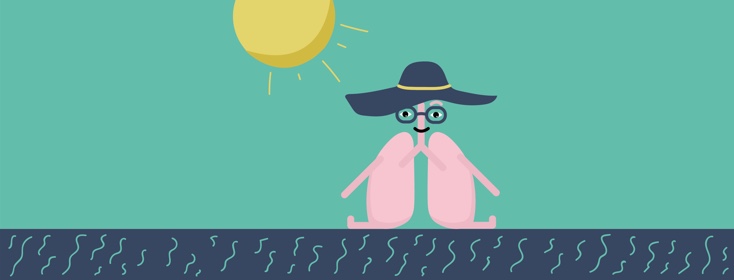Tips for Dealing With Summertime COPD Triggers
Ah... summertime... It's a wonderful time of the year, with warm temperatures, fun times with family and friends and perhaps even the opportunity to travel. However, it can also be a physically stressful time for anyone with a chronic lung condition, including those who have COPD.
Although summer can be fun, it can also bring you into contact with substances or conditions that can trigger COPD symptoms such as:
- Coughing
- Shortness of breath, especially during activity
- Wheezing
- Chest tightness
- Increased mucus in you lungs
- Fatigue
The solution to enjoying the summer months when you have COPD is learning how to recognize and avoid summertime triggers.
Understanding COPD Triggers
In asthma, a chronic lung condition somewhat similar to COPD, when we talk about "triggers," we are talking primarily about things called allergens. Allergens are substances that set off, or trigger, an allergic response in the body that results in airway inflammation and asthma symptoms. If you have both COPD and asthma, or COPD and nasal allergies, then you might share some of these triggers, such as:
- Tree, grass and weed pollen
- Dust mites
- Pet dander & urine
- Mold
- Insect droppings
However, in COPD, when we talk about triggers, we are referring more often to substances or conditions that can simply irritate your lungs and make your COPD symptoms worse.
Triggers can exist year-round and they can be different for every COPD sufferer. Here are some common triggers during the summer that may affect you:
- Wood smoke from campfires, barbecues or forest fires
- Heat and humidity
- Dehydration and dry air
- Poor air quality
- Travel
Let's look at each of these in greater detail.
1. Wood Smoke
You can, of course, come into contact with wood smoke at any time of the year. But in the summertime, you may be camping, going on picnics or visiting friends where there are cookouts going on, and so forth. If you live in the mountain west like me, you might also be subject to the smoke of forest fires.
The smell of smoke alone can be an irritant. Add to that the tiny particles that burning wood sends into the air, and you may find your COPD control slipping any time you are exposed to any kind of wood smoke, or even the smoke from a gas grill as well.
2. Heat and Humidity
Depending on where you live, summer often brings higher heat and more humid conditions. Humidity greater than 50% can make it harder to breathe, perhaps because high humidity increases the levels of ozone, dust mites and molds in the air.
People with chronic illnesses also tend to be more sensitive to hot temperatures and at risk of heat exhaustion.
3. Dehydration and Dry Air
At the same time, you may live in an area, as I do, where humidity drops markedly during the hot, dog days of summer. Dry air can be very irritating to the airways, and can also make it hard to stay hydrated. If you become dehydrated, you will be more fatigued and coughing up the thickened mucus in your lungs will be harder.
4. Poor Air Quality
During hot, sunny days, ozone and particulate matter levels in the air often rise. This air pollution results from factory emissions, car exhaust, dust and includes smoke as well. Although ozone and particulate matter are not visible, they can be extremely irritating to the airways of someone with COPD.
5. Travel
Lastly, another trigger can be loosely tied to travel, whether short-range or long-range. There are many factors with travel that may result in triggering of COPD symptoms:
- You might overexert yourself physically while traveling, or become stressed or anxious about traveling or your destination.
- You can be unexpectedly exposed to chemicals, smoke or strong odors that are irritating to your airways.
- If you also have allergies, you may come into contact with allergens that you're able to avoid at home.
- You may be tempted to make less than healthy choices.
- Remembering to take your medications or turn on your oxygen may be challenging when you're busy having fun.
Managing Your Summertime Triggers Effectively
I'm not suggesting that you become a hermit during the summer for fear of encountering one of these summer triggers. Of course not! You still need to live life, the best you can, on your terms. But you also need to plan ahead and take care of your health the best you can.
So, take steps to avoid these triggers as much as possible. Perfection is not the goal; but any steps you take to minimize your exposure will be worth it. Stay indoors behind closed windows and with the air conditioner (with HEPA filter) on, especially at times when the air quality is poor, or when it's especially hot and humid.
Stay hydrated by drinking a glass of water every hour, if you can.
Monitor the air quality by checking with your local news stations or at the EPA website, Airnow.gov.
Keep your prescriptions up-to-date, and if you use it, your oxygen supply filled. Plan ahead before you travel to make sure you won't run short of medicine or oxygen. Do your research about where you're headed, so that you can plan accordingly to stay safe.
Ask family or friends to support you during travel, if needed. Take your time, and try to avoid stressful situations.
And, most of all, enjoy your summer!
Have any summertime tips not listed above? Share them with our community here!

Join the conversation